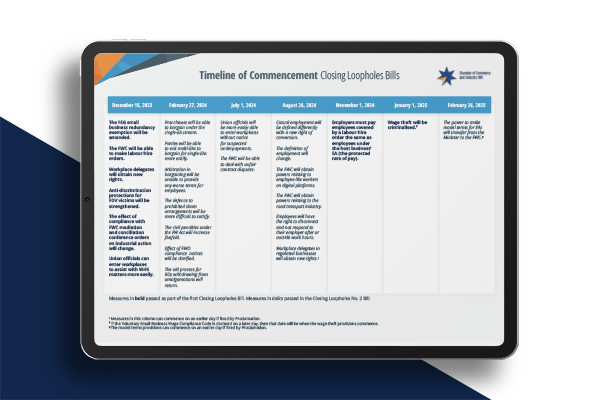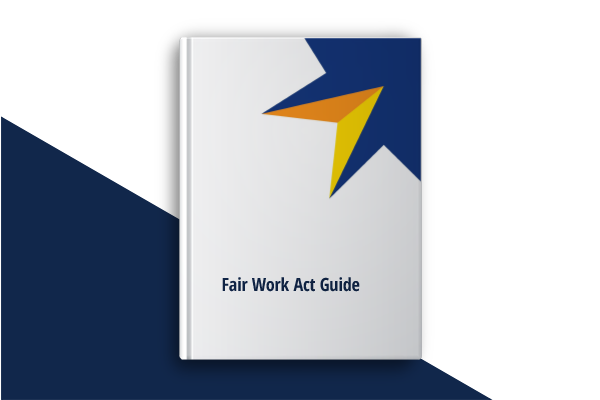New Workplace Laws
WA businesses face a seismic shift to the industrial relations landscape following major changes to Australia’s workplace laws. The changes will add cost and complexity to running a business, so it’s important you understand the new laws, and your business is prepared.
‘Helping you through the new IR laws’ – Webinar Series
These recorded sessions are here to help you navigate the challenge of the new workplace laws and to ensure you’re aware of how you and your business are affected.

Not a Member? Get one free call with our experienced IR & HR experts.
Our team of skilled and trusted advisers are ready to support you every step of the way.
Here are changes you need to know about
There is a new “general rule” for defining an employee as casual, which encompasses an absence of a firm advance commitment to continuing and indefinite work and that the employee is entitled to a casual loading or a specific casual rate. This will be followed by a number of ‘indicia’ which are to be used in this assessment.
Employees will now be able to provide written notification to their employer that they believe they no longer meet the definition of casual employee.
Expected start date: August 26, 2024
These changes will impact on businesses who engage labour hire and have an enterprise agreement in place. If enterprise agreement terms are better than those for labour hire employees, orders can enforce equivalent rates and conditions as if they were direct hire employees.
Start date: December 15, 2023
There is now a new definition to the ordinary meaning of an employee and an employer. This will be used when determining whether a worker is an employee or an independent contractor.
The relationship is to be determined by ascertaining the real substance, practical reality and true nature of the relationship between the individual and the person and considering the “totality” of the relationship. This not only applies to a written contract but also how it is done in practice and marks a return to the inconsistency of the multi-factorial test.
Expected start date: August 26, 2024
It will be a criminal offence to intentionally underpay your staff. Penalties include up to 10 years’ imprisonment for an individual, and three times the amount of the underpayment or $1.565 million (whichever is greater), or three times the amount of the underpayment or $7.825m for a body corporate (whichever is greater). Civil penalties for underpayments that do not constitute wage theft will also increase by at least fivefold.
Start date: January 1, 2025
There is now a new definition of “employee-like” workers who perform digital platform work (gig economy workers) under a services contract, and who meet certain criteria. The Fair Work Commission will have powers to make new minimum standards orders and minimum standard guidelines. There is also an “unfair deactivation” jurisdiction for the FWC to deal with disputes under employee-like workers’ deactivation from a digital labour platform.
Expected start date: August 26, 2024
The new laws introduce provisions for independent contractors in the road transport industry, similar to the ones proposed for gig economy workers.
The FWC will have the ability to set a range of minimum standards and guidelines, and there will be access to consent-based collective agreements and dispute resolution procedures for workers within this industry, who are not employees.
It also establishes an Expert Panel for the road transport industry and a Road Transport Advisory Group.
Expected start date: August 26, 2024
Union delegates will now have new rights and protections. This includes that an employer cannot unreasonably refuse to deal with delegates; knowingly or recklessly making false or misleading representations to a delegate; and unreasonably hindering, obstructing or preventing the exercise of the rights of the delegate.
Start date: December 15, 2023
The changes introduce stronger protections against discrimination for employees who have been subjected to family and domestic violence. This includes new protections for employees who have or are being subjected to family and domestic violence. It also prohibits the inclusion of terms into industrial instruments that discriminate against employees on these grounds.
Start date: December 15, 2023
New WHS laws impose a primary duty of care a “person conducting a business or undertaking” (PCBU). Increased penalties include the offence of industrial manslaughter, which carries a potential imprisonment term of up to 20 years and a fine of up to $5 million for an individual or PCBU and up to $10m for a body corporate.
Start date: March 31, 2022
Employees will have the right to disconnect and not respond to their employer after or outside work hours. If an employer takes adverse action against an employee for exercising these new rights, they will be at risk of breaching the general protections provisions.
Expected start date: August 26, 2024
Arbitrated decisions by the FWC in bargaining disputes cannot offer worse terms for employees than those that exist in any pre-existing enterprise agreement. Under the changes, the terms in a workplace determination, other than wage increase and agreed terms, can be no less favourable to employees or employee organisations compared to a term in an existing enterprise agreement.
Expected start date: February 27, 2024
The current definition of sham contracting (when misrepresenting employment as an independent contractor arrangement) will change. The new law requires that the employer reasonably believes the contract is a contract for service, which will result in a more objective test.
Expected start date: February 27, 2024
5 tips to understanding the new workplace laws:
View Our Webinars
Watch recorded sessions that’ll help you navigate the new laws, and inform you on how your business is affected.
Read Our Articles
Our team have prepared current, comprehensive reading material to assist you in understanding the key changes.
Use Our Resources
We have an extensive range of up-to-date resources to help you navigate the challenge of the new workplace laws.
Attend Our Events
To help keep you informed, we have a wide range of upcoming online and in-person events that you’re able to attend.
Call Our Experts
The WA-based Employee Relations Advice Centre is here to assist you in managing your employee relations & IR needs.
Latest News
Resources
We have an extensive range of up-to-date resources to help you navigate the challenge of the new workplace laws.
‘IR Reform Unpacked’ – Webinar Series
Our ‘IR Reform Unpacked’ webinar series is available exclusively to Members.
Our Membership Packages have been created to connect you to the resources and people you need to be successful.
‘Helping you through the new workplace laws’ – Webinar Series
These recorded sessions are here to help you navigate the challenge of the new workplace laws and to ensure you’re aware of how you and your business are affected.
Upcoming Webinars & Events
We have a range of upcoming webinars and events to keep you informed.

Quick Dates Guide
The remainder of the Federal Government’s Closing Loopholes Bill, including intractable bargaining provisions, changes to casual employment and the right to disconnect, has passed Parliament – signalling the start of new Australian workplace laws. Our Quick Dates Guide outlines the key changes that are going to impact businesses of all sizes, nation-wide.

Fair Work Act Guide
Containing simple, easy to read information on employer obligations under the Fair Work Act 2009, this Guide is a must for individuals charged with the day-to-day responsibility of managing a business and/or employees. It includes condensed case law summaries and explanations on how the law should be applied, with regular updates to reflect changes in legislation or case law.
Timeline of changes
- The power to make model terms for EAs will transfer from the Minister to the FWC (Can commence on an earlier day if fixed by Proclamation)
- Wage theft will be criminalised (May be delayed if Voluntary Small Business Wage Compliance Code is declared on a later day)
- Employers must pay employees covered by a labour hire order the same as employees under the host business’ EA (the protected rate of pay)
- Casual employment will be defined differently with a new right of conversion
- The definition of employment will change
- The FWC will obtain powers relating to employee-like workers on digital platforms The FWC will obtain powers relating to the road transport industry
- Employees will have the right to disconnect and not respond to their employer after or outside work hours
- Workplace delegates in regulated businesses will obtain new rights
(The above measures can commence on an earlier day if fixed by Proclamation)
- Union officials will be more easily able to enter workplaces without notice for suspected underpayments
- The FWC will be able to deal with unfair contract disputes
- Franchisees will be able to bargain under the single-EA stream
- Parties will be able to exit multi-EAs to bargain for single-EAs more easily Arbitration in bargaining will be unable to provide any worse terms for employees
- The defence to prohibited sham arrangements will be more difficult to satisfy The civil penalties under the FW Act will increase fivefold
- Effect of FWO compliance notices will be clarified
- The old process for ROs withdrawing from amalgamations will return
- Changes to EA approval process, including a new Statement of Principles on Genuine Agreement
- Changes to the better off overall test (BOOT)
- New single interest and supported bargaining streams (multi-employer bargaining)
- Changes to bargaining disputes, including increased avenues for arbitration
- Changes to protected industrial action
- Changes to flexible working requests and unpaid parental leave requests
- Penalties for pay secrecy and new workplace rights for employees
- Notification to employees due for pre-reform agreements
- Fixed and maximum term contracts will be limited to two years (including extensions)
- Sunsetting of pre-reform agreements
- Inclusion of Superannuation entitlements in the NES
- More flexibility for unpaid parental leave under the NES
- Workplace determinations for EA matters
- Changes to deductions from wages
- Casuals treated the same as permanent EEs under Coal Mining LSL Scheme
- Greater protections for migrant workers
- “Same Job, Same Pay” for labour hire workers
- Criminalisation of “wage theft”
- Strengthening protections under discrimination law
- New rights for union delegates
- Changes to initiating bargaining that allow unions to commence bargaining to replace expired enterprise agreements
- Fair Work Commission (FWC) can deal with minor enterprise agreement errors
- Termination process for enterprise agreements is now more limited
- New FWC expert panels are being appointed
- Sexual harassment orders and FWC Applications available to employees
- Reverse onus of proof for sexual harassment in the workplace
- ROC/ABCC have been abolished
Services
Our expert support services are available to help your business work through the new workplace laws.
Employment Law
CCIWA has an experienced and innovative legal practice that specialises in workplace relations and employment law matters for businesses of all sizes. We have a large team of specialist employment lawyers with substantial experience and success in assisting clients to ensure their workplaces are legally compliant, safe and productive.
Employee Relations Advice Centre
The Employee Relations Advice Centre is here to help you manage your employee relations needs. This includes prompt advice on your circumstances, consulting, documents and current industrial relations information.
Our Members have unlimited access to our Employee Relations Advice Centre.

Not a Member? Get one free call with our experienced IR & HR experts.
Our team of skilled and trusted advisers are ready to support you every step of the way.
Training & Guides
Sign up to a host of training opportunities or utilise our extensive range of guides to learn more about the new workplace laws.

IR Masterclass
Our new IR Masterclass is a unique opportunity to build on your knowledge across a range of industrial relations areas. For those with mid-level experience, it will serve to develop your skills to a professional level and for those with a high-level of experience it will further hone your skills and update you on key concepts across a rapidly evolving profession.

Workplace Training & Learning Solutions
Our workplace learning solutions are developed by our highly experienced Workplace Relations Consultants, who work with you to find the best solution for your needs. Our training workshops are conveniently held at our Perth CBD Offices, or for customised training we can come to you, your team, or your workplace no matter where you are in WA.

Respect@Work Packs
Employers now have a positive duty to take reasonable and proportionate measures to eliminate unlawful sex discrimination, sexual harassment, sex-based harassment, work environments that are hostile on the grounds of sex and victimisation in relation to these matters. CCIWA’s Respect@Work packs can assist you in meeting these very important obligations.

HR Kits and Guides
Our experts prepare and update practical, ready-to-use guides to assist with employee and industrial relations matters. CCIWA Membership gives you discounts on all of our HR Kits and Guides.
Contact Us
Do you need help with how the new workplace laws will affect you? Get in touch today.
Membership
Our Members have unlimited access to our Employee Relations Advice Centre.
The Employee Relations Advice Centre is here to help you manage your employee relations needs. This includes prompt advice on your circumstances, consulting, documents and current industrial relations information.

Not a Member? Get one free call with our experienced IR & HR experts.
Our team of skilled and trusted advisers are ready to support you every step of the way.









